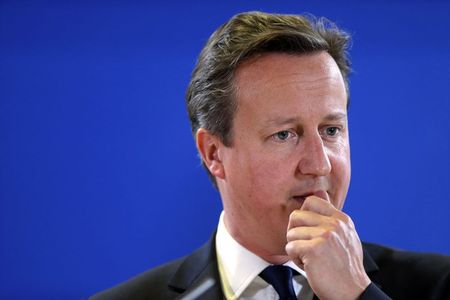After EU defeat, Cameron says ‘can do business’ with Juncker

By Guy Faulconbridge and Andrew Osborn
LONDON (Reuters) – Britain can do business with Jean-Claude Juncker, Prime Minister David Cameron declared on Monday after failing to prevent EU leaders giving the Luxembourger the bloc’s most powerful job in a defeat that could push Britain closer to leaving the EU.
Cameron’s loss of an unprecedented summit vote he forced over the next European Commission president sharpened concern that the world’s sixth largest economy may be sliding towards the exit. Only Hungary sided with Britain in the 26-2 vote.
The British leader struck a more conciliatory tone during a noisy session of parliament on Monday, saying he would work with Juncker and did not want to personalise his appointment.
But the opposition Labour party charged Cameron’s strategy of seeking to reshape Britain’s ties with the EU was in tatters.
“We will now have to deal open and frankly with the new Commission president,” said Cameron, saying Juncker had promised to address the issues of reform that Britain has put on the table. “We now need to make sure we hold him to that.”
Cameron telephoned Juncker to congratulate him on Sunday and in an article published in Britain’s Daily Telegraph newspaper earlier on Monday said the two men could have a productive working relationship if Britain’s concerns were recognised. “If … we can agree that we are not heading, at different speeds, to the same place – as some have assumed up to now – then there is business we can do,” Cameron wrote.
The Conservative prime minister has promised to renegotiate Britain’s EU ties and hold an in/out referendum in 2017 if he is re-elected in a general election next year.
The first opinion poll taken after his defeat over Juncker showed a big plurality of voters now want to leave – 47 percent against 39 percent who want to stay in the EU.
Having spent six weeks criticising Juncker and refusing to talk to him, the British leader faces the awkward task of trying to mend fences with a man he branded a “career Brussels insider” and the wrong person to head the executive that proposes and enforces EU laws.
Cameron, 47, has said that the nomination of Juncker, a 59-year-old former prime minister of Luxembourg, a veteran European deal broker, would make his goal of renegotiating Britain’s EU ties harder.
“I do not deny that it has made the task harder and the stakes higher,” Cameron wrote on Monday. “You don’t turn around a tanker like the EU with ease.”
BREXIT ‘PISTOL’
In heated exchanges in parliament, Ed Miliband, the leader of the opposition Labour party, said Cameron’s plans to change Britain’s EU relationship were in disarray after the defeat.
“He couldn’t get four countries to support him over Mr Juncker,” said Miliband. “And if he can’t get four countries to block the appointment of a president, how an earth is he going to get 27 countries to support a new (EU) treaty? … His renegotiation strategy is in tatters.”
Miliband said the “centre of gravity” of Cameron’s party was drifting towards an EU exit, saying sarcastically that the British leader had given a master class in how to alienate EU allies by using threats, insults and being disengaged.
Defending a strategy that isolated Britain, Cameron has cast himself as a man of principle ready to endure humiliation to argue the case of disenchanted voters who want the EU to change.
All three main political parties in Britain opposed Juncker but critics said Cameron’s confrontational strategy spooked allies, undermined British interests and lubricated the slide towards a British exit, or “Brexit”.
“Stop waving around the threat of a referendum in Britain as if it’s some sort of pistol that we’re holding to everyone’s head and saying that you’ve got to agree with us or else,” said former EU trade commissioner Peter Mandelson, one of the most influential Europhiles.
Cameron has always said he supports EU membership, seen by most bankers and foreign investors as vital to London’s status as the only financial capital to rival New York.
But ahead of the May 2015 election, he faces an electorate upset by immigration while his Conservative party is divided and under pressure from the UK Independence Party which won the European Parliament elections with 27.5 percent of the vote.
UKIP leader Nigel Farage, who wants to take Britain out of the EU, said Cameron’s reform plans were looking “ever more preposterous”.
Janis Emmanouilidis, director of studies at the European Policy Centre in Brussels, said Cameron’s vote defeat suggested Britain’s relationship with the EU was heading for an impasse.
“Despite all his determination, Cameron’s action weakens his position both at national and European levels,” said Emmanouilidis.
“At the European level, the patience in many national capitals and in EU institutions with London seems to be running out … The voices of those arguing that the EU could ‘do without the UK’ are increasing and getting louder in public and behind closed doors.”
(Additional reporting by Sarah Young and William James; Editing by Paul Taylor)